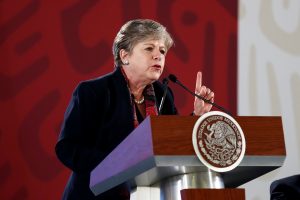Mexico City, May 20 (EFE).- The UN Economic Commission for Latin America and the Caribbean (ECLAC) presented Monday an ambitious development plan in collaboration with the governments of Mexico, Guatemala, Honduras and El Salvador to combat the causes of massive migration in the region.
“It’s an innovative proposal because it sees development in Central America as the way to make migration something that is a choice rather than forced,” the executive secretary of ECLAC, Alicia Barcena, said during the presentation of the program at the National Palace of Mexico.

The United Nations official defined the program, which makes proposals on taxes, investments and infrastructure, as “the most comprehensive initiative that has been presented on a global level.”
“People emigrate because they have to, for the lack of job opportunities or because of the violence, so we have to get to the root of those problems and fix the causes,” said Mexican President Andres Manuel Lopez Obrador.
The leftist leader said it is now essential to “persuade” the United States government to cooperate in the implementation of this program.
“Some progress has been made, and we must acknowledge that officials of the US government of President Donald Trump have shown an interest in hearing this proposal,” he said.
Since the end of last year, the flood of migrants crossing Mexico on their way to the United States has increased, which has caused diplomatic tensions between the Mexican and US governments.
Upon taking office last Dec. 1, Lopez Obrador asked ECLAC to draw up a development plan for the region.
ECLAC identified the main reason for Central Americans migrating to the United States as the lack of jobs, as is the case with 57.1 percent of Guatemalan migrants, 71.5 percent of Hondurans and 62.4 percent of Salvadorans.
According to the UN organization, 362,000 young people in the three countries look for work every year, but only some 127,000 jobs are available in the region.
Other reasons include the violence and insecurity of the area, which, according to Barcena, is “more violent” than the Middle East, as well as the desire to reunite with family members living in the United States.
During the presentation, Barcena asked the three countries and Mexico to increase investment, both public and private, to the point of representing 25 percent of gross domestic product (GDP).
At present, she added, the proportion is 18 percent in El Salvador, 14.2 percent in Guatemala, 22 percent in Honduras and 22.9 percent in Mexico.
She also urged these countries to eliminate tax privileges, cut bureaucratic red tape on the transport of goods among the countries of the region, and promote the use of remittances coming from abroad to develop local businesses.
A list of infrastructure projects was another part of Barcena’s proposal, notably the interconnection of electric power lines and gas pipelines between Mexico and northern Central America.
